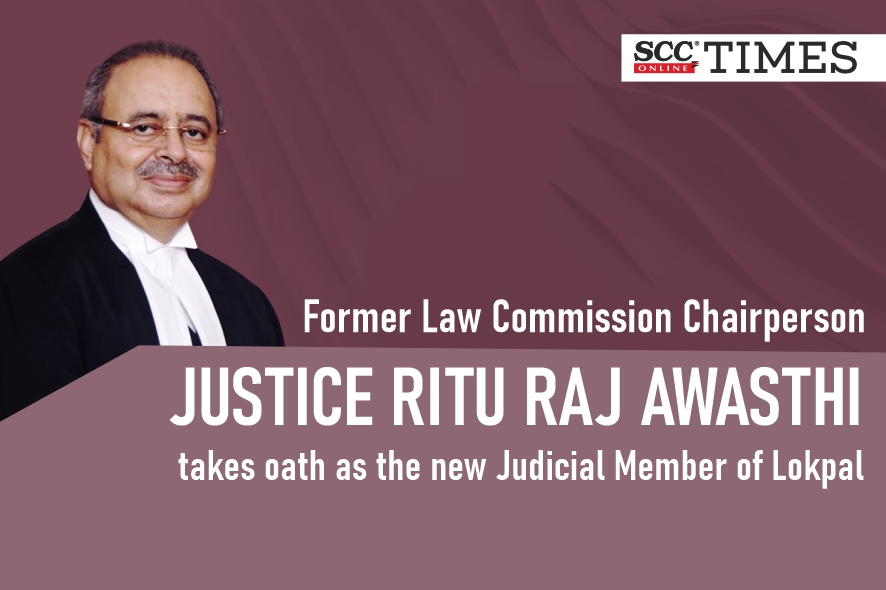Former Chief Justice of Karnataka High Court, Justice Ritu Raj Awasthi, took oath as the new Judicial Member of Lokpal on 27-03-2024. Justice Awasthi, who was functioning as the Chairperson of Law Commission of India, has resigned from the post which he assumed in November 2022, after a tenure of 17 months.
On 10-03-2024, the President had administered the Oath of Office of Chairperson, Lokpal to Justice A.M. Khanwilkar, former Judge, Supreme Court of India1.
Justice Ritu Raj Awasthi is an alumnus of Lucknow University, and he began his legal career as an Advocate in 1987. Justice Awasthi practised mostly in Civil, Service, Educational matters at Lucknow Bench, Allahabad High Court.
Justice Ritu Raj Awasthi was also appointed as the Asst. Solicitor General of India at Lucknow before his elevation as Additional Judge on 13-04-2009. Justice Awasthi was later elevated Permanent Judge on Dec 24-12-2010.
After serving Allahabad High Court as a Judge for 11 years, Justice Awasthi was elevated as Chief Justice of Karnataka High Court on 11-10-2021. He remained on this post till retirement in July 2022.
On 09-11-2022, Justice Ritu Raj Awasthi was appointed as the Chairperson of the 22nd Law Commission of India2. During Justice Awasthi’s tenure as Chairperson, the Law Commission of India made certain important recommendations and solicited opinion on significant topics such as Uniform Civil Code:
Law Commission recommends retaining of Sedition Law in IPC with increased punishment
The Law Commission of India responding in its Report No. 279 on the subject “Usage of the Law of Sedition,” said that Section 124-A needs to be retained in the Penal Code, 1860 (‘IPC’) with certain amendments which can be introduced in it by incorporating the ratio decidendi of Kedar Nath Singh v. State of Bihar, 1962 Supp (2) SCR 769, which says that Section 124-A is constitutionally valid. The restrictions imposed on the freedom of speech and expression are in the interest of public order and are within the ambit of permissible legislative interference with the fundamental right. But the section must be so construed as to limit its application to acts involving intention or tendency to create disorder or disturbance of law and order or incitement to violence.
[Uniform Civil Code] 22nd Law Commission decides to solicit views of public/ religious organizations
On 14-6-2023, the 22nd Law Commission of India decided to solicit views and ideas of the public and recognized religious organizations about the Uniform Civil Code (‘UCC’).
Law Commission recommends not to change Law on Adverse Possession
The Law Commission of India, headed by Justice Ritu Raj Awasthi, responding in its Report No. 280 on the subject “The Law on Adverse Possession” said that there is no justification for introducing any change in the law relating to adverse possession. The Ex-officio member of Law Commission dissented and said that the law of adverse possession serves no useful purpose considering the enactment of land laws in all the States for the welfare of the poor and the possibility of fraudulent claim of adverse possession as is established by large number of cases where courts have declined the claim of adverse possession.
[Law Commission Report 283] Law Commission recommends amending POCSO Act, JJ Act and Penal Code
On 27-9-2023, the Law Commission of India publishes its Report No. 283 on the subject “Age of Consent under the Protection of Children from Sexual Offences Act, 2012” (‘POCSO’). The Report talks about bringing certain amendments in the POCSO Act to remedy the situation where there is a tacit approval in fact and not a consent in law on part of the child aged between 16 to 18 years. However, the Commission was of the view that it is not advisable to tinker with the existing age of consent under the POCSO Act.
Law Commission advocates for retaining criminal defamation
The Law Commission’s 285th Report recommended the retention of criminal defamation as an offence within the scheme of criminal laws in the country. The 22nd Law Commission took up the issue and review of the law relating to criminal defamation after a reference was received from the Ministry of Law & Justice in 2017 seeking to examine the subject of Defamation laws and related issues. The law of criminal defamation is enumerated in Sections 499, 500, 501 and 502 of the Penal Code, 1860 (‘IPC’).
Law Commission recommends revision and review of Epidemic Diseases Act, 1897
In its 286th Report titled “A comprehensive review of the Epidemic Diseases Act, 1897”, the 22nd Law Commission recommended for suitable amendment to existing law for addressing existing gaps, or enactment of new comprehensive legislation on the subject. The Commission expressed that the existing legislation exhibited significant deficiencies in addressing the containment and management of future epidemics, apprehending emergence of new infectious diseases or novel strains of existing pathogens.






